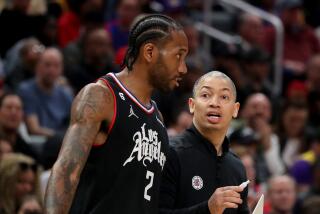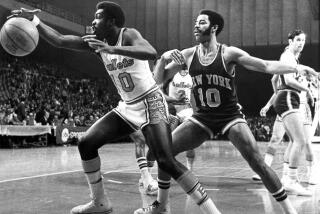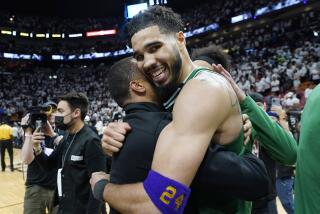For Red Klotz, Losing Isn’t Everything--It’s the Only Thing : Somehow, He Still Has a Will to Win
- Share via
RENO — The Generals pull within four points and the unthinkable becomes thinkable.
It has been 14 years since that strange night back in Martin, Tenn., when they last knew victory, when the player-coach made his two-hand set shot for the winning points and then, amid a terrible booing, froze the ball. “It was like killing Santa Claus,” he remembers.
But here it is, 1985, in the Lawlor Events Center. Just four points with nearly three minutes to go. Red Klotz, 64, still player-coach-owner, is on his feet. Maybe before he dies, after all. Just two baskets--two lousy baskets away.
Then the Generals’ Gerald Hooks gets careless on defense. He is called for attempted murder, which is a shooting foul. Momentum is reversed. Geese Ausbie makes his throws and the Harlem Globetrotters go on to an 88-81 victory.
The Generals, disappointed, do not even shower but board the bus and roll back to the hotel. Of course they are disappointed. It seems that something always happens--every night--on this, the longest and toughest basketball trip of all time.
The next morning, before the team heads out for Las Vegas, where it will play the Globetrotters again that night, Klotz is surprisingly hopeful. “We were one step away,” he says. “You saw what I mean, I hope. They got anxious. Ausbie began clogging up the middle at the end. You could see they were concerned.”
But something always happens. “I don’t know,” he says. “We came out shooting so well, but they were shooting unbelievable. Curly Neal was 4 for 4. They’re good. And they’ve got that 7-2 Robert Paige. But one of these nights. . . . “
It may not be tonight and it may not be this weekend when the Globetrotters and Generals play Saturday and Sunday at the Forum, or even next week, when they play Monday and Tuesday at the Anaheim Convention Center. When a team goes 14 years without a victory, playing seasons that are 175 games long, winning is no longer what you’d call predictable.
Yet, Red Klotz insists that his team tries to win every night.
It may be a difficult concept to get your mind around, that the Washington Generals are actually trying to win.
The graying Sam Sawyer, who plays the pivot against the equally gray Ausbie, ought to be alert to that little move at the top of the key, the one on which Ausbie wraps the ball behind Sawyer’s back. And Hooks ought not to be so surprised when he steams downcourt to cover the fast-breaking Ausbie under the basket. Ausbie must have handed the ball off to Hooks--and out of bounds--about 10,000 times now.
Certainly a coach like Klotz, who says he stresses fundamentals, would advise his players to be more alert at the foul line. How many times has Ausbie--oh, that Ausbie--sneaked up from behind and picked the ball right out of the free-throw shooter’s hands? Just every night is all.
The Generals are trying to win? And they commit attempted murder in the last three minutes, down by just four points? Come on.
But let’s not be too hard on Klotz and his Generals. It probably will not spoil it for you to suggest that the Globetrotters have a show to put on, and that the Generals’ job is not to get in the way of that show. What if Hooks did wise up finally and realize that Ausbie was tucking the ball under the jersey? How much fun would it be to watch Hooks try to wrestle the ball away? Better he look mystified at the disappearance.
That’s what the Generals are for, why they were created, to provide the straight lines in this basketball cabaret. It’s not funny without them. Once upon a time, there was not regular opposition for the Harlem Globetrotters, the barnstorming team that originated in 1927. As a consequence, it was not regularly funny.
Abe Saperstein, the creator, would find his opponent wherever the Globies happened to be. But that could be tricky. Say that you’re one of the local stars and are asked, in the spirit of good fun, to tolerate some on-court high jinks. Say your girlfriend is in the stands. Say Marques Haynes is doing his dribbling act and you are obliged to be the chaser. Say you are humiliated and refuse to chase. Say there is a fight. . . .
Well, that’s not family entertainment, is it? So Saperstein began engaging minor-league clubs as opposition. Klotz, who was the shortest player in the NBA--he was a 5-7 set shooter for the world championship Baltimore Bullets in 1948, his one year in the league--and who had gone on to managing his own minor-league team, was finally supplying that opposition.
His team, then called the Philadelphia Spas, beat the Globetrotters in consecutive games, at Philadelphia and at Syracuse, and Saperstein was impressed. He signed up the Spas right away, initiating the losingest franchise in the history of pro sports.
Klotz, you will not be surprised to learn, is not that bad a loser, having learned that on this schedule there is always tomorrow night or even next year. Anyway, he is owner of the team and his job is secure. But he really would like to win one. Really.
To that end, he gets good players, players with a sense of humor to be sure, but good minor-league players in any event. Charlie Criss was on his team at one time. Sam Pellom was another player who graduated to the NBA. His players aren’t stiffs. Some, in fact, have been so talented that the Globetrotters took them.
Klotz schools them in fundamentals. “If we have five turnovers in a game, I just can’t tolerate that,” he says. “Each possession means something to me. No coach is happy with turnovers, and I’m especially unhappy with them.”
You’re having trouble taking Red seriously? Take him seriously. Watch the Generals play. There are not many turnovers. When the Globetrotters mess up on one of their comic routines, they are not allowed to get away with it. Think about it: Would it be fun to watch if, when Sweet Lou Dunbar missed his half-court shot, one of the Generals trotted the ball out for him to try again?
Believe it or not, there are periods during the game when the teams appear to be going something like full bore. It is not hard to tell when.
It is when, for example, Ausbie does not substitute the wobble ball for the real one. Saperstein knew one thing: People like to see good basketball as well as funny basketball. The Globetrotters can play both. The Generals can play at least one.
On the bus to the game in Reno, Klotz speculated on his losing streak. Apart from the elements of the show--you can’t truly expect Hooks to scoop up the basketball when Ausbie lays it down and walks off--the Generals play them pretty even.
“But they have better players,” Klotz concedes. “And bigger players. When you play each other every night, like we do, you get to know each other’s moves and weaknesses.
“It’s like the rookie who’s averaging 20 points the first time through the league. And then, the second time around, word gets out that he can’t go to his left. Imagine, we play each other 175 times a season. That’s 175 times through the league.”
Klotz’s biggest job, obviously, is to motivate. The show is no good if the Generals lie down and die. But not everybody likes to lose, and lying down and dying becomes an enviable option.
One player just didn’t have the patience to do what the Generals have to do, and Klotz had to ship him out. Mostly, though, Klotz just stays on his boys. “I raise hell when the team doesn’t put out,” he says. “I expect them to go out and play tough basketball.”
When they don’t, Klotz fines them. Or fires them.
There is losing and then there is losing. “We are not stooges,” Klotz says. “It would be dull if we were and that’s one thing the show cannot be. Losing with respect means something to me. Losing doesn’t mean you’re not a hell of a team. Most teams do lose, even the Miami Dolphins.”
Of course the Dolphins do not lose to the 49ers every night. That is a big difference. On the other hand, even if they did, they would be trying to win all the time. Wouldn’t they?
“They just may have the better team,” he says of the Globetrotters. “All the same, we almost got them in Portland. They were sweating.”
The bus stops to pick up the Globetrotters--and, let’s not be naive, the two officials. Klotz notes that this is not standard procedure. This is a scheduling quirk. Normally they travel in separate buses. No fraternization.
As the Globies get on, Klotz jokes with them. “That’s Curly Neal,” he says. “I was his chaser for years. That’s Lou Dunbar. He can still play, even if has a little weight in his can now.”
Some of the Globies settle in seats nearby. But before the bus leaves for the arena, Klotz gets up and changes seats.
“We’re in enemy territory,” he says, moving away from the Globetrotters. “Let’s get out of here.”
More to Read
Go beyond the scoreboard
Get the latest on L.A.'s teams in the daily Sports Report newsletter.
You may occasionally receive promotional content from the Los Angeles Times.










